
Toxicological Research
Scope & Guideline
Bridging science and safety in the field of toxicology.
Introduction
Aims and Scopes
- Mechanistic Toxicology:
Research focused on understanding the biochemical and molecular mechanisms by which toxic substances exert their harmful effects on biological systems. - Risk Assessment and Safety Evaluation:
Studies assessing the safety and risk associated with exposure to chemical substances, including pharmaceuticals, environmental pollutants, and food additives. - Toxicity Testing and Method Development:
Innovative methodologies for evaluating the toxic effects of substances, including in vitro and in vivo assays, as well as computational models for predicting toxicity. - Environmental Toxicology:
Investigations into the impact of pollutants and toxic substances on ecosystems, wildlife, and human health, including studies on bioaccumulation and biomagnification. - Pharmacological Toxicology:
Research exploring the adverse effects of drugs and therapeutic agents, including their mechanisms of toxicity and potential protective strategies. - Nanotoxicology:
Studies examining the toxicological implications of nanomaterials and their interactions with biological systems, highlighting the unique properties of nanoparticles.
Trending and Emerging
- Microbial and Environmental Interactions:
Research exploring the interactions between microbial communities and toxic substances is on the rise, emphasizing the significance of microbiomes in modulating toxicity and health outcomes. - Nanomaterials and Nanotoxicology:
The field of nanotoxicology is rapidly expanding, with increasing research on the safety and toxicological profiles of nanomaterials, driven by their growing applications in medicine and industry. - Biomarkers of Exposure and Effect:
There is a growing emphasis on identifying and validating biomarkers for assessing exposure to toxicants and their effects, facilitating early detection and intervention strategies. - Toxicity of Emerging Contaminants:
Research into the toxicological impacts of emerging contaminants, such as pharmaceuticals and personal care products, is gaining traction as these substances become more prevalent in the environment. - Computational Toxicology:
The integration of computational models and machine learning techniques is becoming increasingly popular for predicting toxicity, enhancing the efficiency of toxicological assessments. - Oxidative Stress and Inflammation:
Studies focusing on the role of oxidative stress and inflammation in toxicological responses are trending, highlighting their importance in understanding disease mechanisms related to toxic exposures.
Declining or Waning
- Traditional Chemical Toxicology:
Research centered around classical chemical toxicology is becoming less prominent as newer methodologies and interdisciplinary approaches gain traction, shifting the focus towards mechanistic and systemic studies. - Animal Testing Models:
While animal testing remains a critical aspect of toxicology, there is a noticeable decline in studies relying solely on animal models, with a growing emphasis on alternative methods and in vitro assessments. - Single-Agent Toxicity Studies:
Investigations focusing on the toxicity of single compounds are waning as research increasingly considers the effects of mixtures and cumulative exposures, reflecting real-world scenarios. - Longitudinal Studies in Traditional Settings:
Long-term studies in conventional laboratory settings are decreasing in favor of studies that incorporate more complex, real-world environments and conditions.
Similar Journals

TOXICOLOGY AND APPLIED PHARMACOLOGY
Advancing the Frontiers of Toxicology and PharmacologyTOXICOLOGY AND APPLIED PHARMACOLOGY, published by Academic Press, Inc. Elsevier Science, stands as a leading journal in the domains of toxicology and pharmacology, with its establishment dating back to 1959. With an impact factor reflecting its academic rigor and relevance, this journal is classified in the Q2 quartile for both pharmacology and toxicology categories, underscoring its significance in the scientific community. It ranks #34 out of 133 in Toxicology and #95 out of 313 in Pharmacology according to Scopus, placing it within the 74th and 69th percentiles, respectively. The journal aims to disseminate quality research that drives advancements in understanding the interactions of drugs and toxic substances within biological systems. Researchers and professionals are invited to contribute and engage with a broad spectrum of articles that cover mechanistic studies, risk assessment, and innovative therapeutic strategies. Although the journal does not offer open access, it continues to be a crucial resource for those who seek to navigate the complex interface of drugs and their toxicological implications.
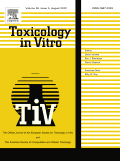
TOXICOLOGY IN VITRO
Exploring the Frontiers of In Vitro ToxicologyTOXICOLOGY IN VITRO is a premier journal published by PERGAMON-ELSEVIER SCIENCE LTD, focusing on the latest advancements in the field of toxicology, particularly through in vitro methodologies. With an ISSN of 0887-2333 and an E-ISSN of 1879-3177, this journal serves as a critical platform for researchers aiming to disseminate their findings in toxicology, emphasizing innovative approaches and applications in pharmacology and toxicology. Featuring a commendable impact factor and classified in the second quartile (Q2) for both Medicine (miscellaneous) and Toxicology in 2023, the journal holds a significant position within the academic community, ranking 41st out of 133 in the Toxicology category according to Scopus, representing the 69th percentile. Despite being a subscription-based publication, it continuously attracts submissions from leading scientists worldwide, fostering a vibrant exchange of scientific knowledge. Since its inception in 1987, TOXICOLOGY IN VITRO has consistently aimed to enhance understanding of toxicological challenges, making it an invaluable resource for professionals, students, and researchers dedicated to developing safer pharmaceuticals and understanding the biological pathways influenced by potential toxic agents.
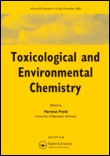
TOXICOLOGICAL AND ENVIRONMENTAL CHEMISTRY
Innovating solutions for a sustainable and healthy future.TOXICOLOGICAL AND ENVIRONMENTAL CHEMISTRY is a pivotal journal published by Taylor & Francis Ltd, addressing critical intersections between environmental chemistry and toxicology since its inception in 1979. With its ISSN 0277-2248 and E-ISSN 1029-0486, the journal serves as a platform for rigorous research and innovative methodologies in pollution control, health implications of environmental chemicals, and the broader spectrum of toxicological studies. Although it currently does not offer open access, the journal's impact in the field is underscored by its Category Quartiles rankings in 2023, placing it in Q3 across Environmental Chemistry, Health, Toxicology and Mutagenesis, and Pollution categories. Furthermore, its Scopus rankings reveal its significant role within the scientific community, specifically in areas such as Environmental Science and Toxicology. The journal aspires to foster multidisciplinary dialogue and advance knowledge that contributes to environmental sustainability and public health, making it an essential resource for researchers, professionals, and students dedicated to these fields.

BULLETIN OF ENVIRONMENTAL CONTAMINATION AND TOXICOLOGY
Unveiling the impacts of toxins on ecosystems and society.BULLETIN OF ENVIRONMENTAL CONTAMINATION AND TOXICOLOGY, published by SPRINGER, is a pivotal journal in the fields of Environmental Science, Toxicology, and Public Health. With a strong history of dissemination since its inception in 1966, the journal predominantly focuses on the latest advances in understanding environmental contaminants and their toxicological effects on health and ecosystems. It currently holds a respectable Q2 ranking across multiple categories including Health, Toxicology and Mutagenesis, Medicine (miscellaneous), and Pollution, as per the 2023 metrics. While the journal is not Open Access, it provides an invaluable platform for researchers, professionals, and students seeking to contribute to and stay informed on critical issues regarding environmental hazards and their implications. With an engaged community of scholars and practitioners, this journal continues to be an essential resource for addressing the pressing challenges of environmental contamination and its health impacts, guiding future research and policy decisions.

Forensic Toxicology
Pioneering Research in Forensic ToxicologyForensic Toxicology is a premier journal published by Springer, renowned for delivering cutting-edge research in the realms of toxicology, biochemistry, and forensic medicine. With an ISSN of 1860-8965 and an E-ISSN of 1860-8973, this journal has established itself as a significant resource for professionals, researchers, and students engaged in the analysis of toxic substances within a forensic context. Its impressive impact factor and ranking reveal its influential presence in the field, particularly as it is categorized in Q1 for Pathology and Forensic Medicine and Q2 for Biochemistry (Medical) and Toxicology. Featured articles span a wide array of topics, facilitating interdisciplinary collaboration and advancing scientific knowledge. While currently not an open-access journal, it remains accessible through institutional subscriptions. With a convergence span from 2006 to 2024, Forensic Toxicology is committed to publishing high-quality research that enhances the understanding of toxicological phenomena and their implications in forensic investigations, reinforcing its role as an indispensable resource in the scientific community.
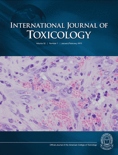
INTERNATIONAL JOURNAL OF TOXICOLOGY
Illuminating the Pathways of Toxicology Research since 1982.The International Journal of Toxicology, published by SAGE Publications Inc, serves as a cornerstone of scholarly research in the field of toxicology, with an established history dating back to 1982. This esteemed journal, ISSN 1091-5818 and E-ISSN 1092-874X, functions within the Q3 quartile in Toxicology, ranking 94 out of 133 in the Pharmacology, Toxicology and Pharmaceutics category per Scopus metrics, reflecting its commitment to advancing scientific understanding in this critical area. The journal not only aims to disseminate high-quality research but also encourages open access to vital studies, thus fostering collaboration and innovation among researchers, professionals, and students alike. With a focus on various aspects of toxicology, including but not limited to environmental, clinical, and molecular toxicology, the International Journal of Toxicology is dedicated to bridging gaps in toxicity research and promoting safe practices across numerous disciplines. As it converges towards 2024, the journal continues to play a vital role in shaping the discourse surrounding the implications of exposure to toxic substances in human health and the environment.
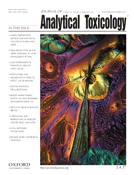
JOURNAL OF ANALYTICAL TOXICOLOGY
Exploring the Depths of Toxicological ScienceJOURNAL OF ANALYTICAL TOXICOLOGY, published by Oxford University Press Inc, stands as a leading platform in the field of analytical chemistry and toxicology, focusing on the rigorous exploration of methodologies and advancements in the detection of toxic substances. Since its inception in 1977, this journal has continually contributed to the scientific community, providing researchers and professionals with vital insights into chemical health, safety, and environmental implications. With an impressive Q1 ranking in both Analytical Chemistry and Chemical Health and Safety, along with reputable Q2 rankings in Environmental Chemistry and Toxicology, the journal maintains its critical standing in vibrant academic communities, ensuring the dissemination of high-quality research. Although it currently does not offer open access, articles are made available via institutional subscriptions, allowing widespread access to its valuable findings. Located in the United States, the journal contains a wealth of knowledge poised to benefit scientists and scholars engaged in toxicological research, emphasizing its importance in enhancing public health and safety.

Toxics
Elevating standards in chemical safety and health.Toxics is a leading international journal published by MDPI that has been dedicated to advancing the knowledge in the fields of toxicology, environmental health, and chemical safety since its inception in 2013. With an impressive Open Access model, it ensures that all research findings are readily available to a global audience, fostering collaboration and innovation across academia and industry. The journal is esteemed for its rigorous peer-review process and holds notable rankings, including Q1 status in Chemical Health and Safety and Q2 in both Health, Toxicology and Mutagenesis and Toxicology, reflecting its impact on critical research areas. Based in Basel, Switzerland, Toxics provides a platform for researchers, professionals, and students to disseminate significant findings on the implications of toxic substances in health and the environment, aiming to improve public health outcomes and inform regulatory decisions. With its ongoing commitment to high-quality research and relevant access options, Toxics continues to be an essential resource in the domain of toxicology and environmental sciences.
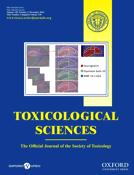
TOXICOLOGICAL SCIENCES
Empowering Research, Protecting HealthTOXICOLOGICAL SCIENCES, published by Oxford University Press, is a premier journal in the field of toxicology that has been a cornerstone of scientific discourse since its inception in 1981. With an impressive 2023 impact factor and ranked in the Q1 category for Toxicology, this journal is highly regarded among researchers, professionals, and students dedicated to pharmacology and toxicology. The journal is committed to advancing the understanding of toxicological science, covering a breadth of topics that include the mechanisms of toxicity, risk assessment, and the regulatory aspects affecting public health. With an ISSN of 1096-6080 and an E-ISSN of 1096-0929, TOXICOLOGICAL SCIENCES facilitates open access scholarly work, ensuring that critical research reaches a global audience and promotes collaborative learning. As it converges towards 2024, the journal remains pivotal in shaping the future of toxicology research, providing insights that are essential for developing safer chemicals and protecting environmental health.
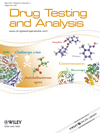
Drug Testing and Analysis
Pioneering Innovative Solutions in Drug AnalysisDrug Testing and Analysis is a leading scholarly journal published by WILEY, dedicated to advancing the field of drug testing and analytical methods. With ISSN 1942-7603 and E-ISSN 1942-7611, this journal provides a platform for the latest research in Analytical Chemistry, Pharmaceutical Science, and Environmental Chemistry, holding a prestigious reputation reflected in its Q1 and Q2 rankings across various categories in 2023. The journal promotes high-impact studies that explore innovative methodologies, with a specific focus on pharmacological and toxicological analyses, making it an essential resource for researchers, professionals, and students concerned with drug efficacy, safety, and environmental impact. With a strong commitment to quality and relevance, Drug Testing and Analysis remains at the forefront of contemporary scientific inquiry, contributing significantly to both academic and practical advancements in the industry.